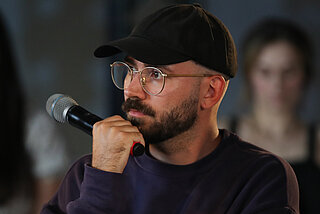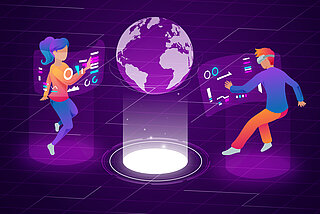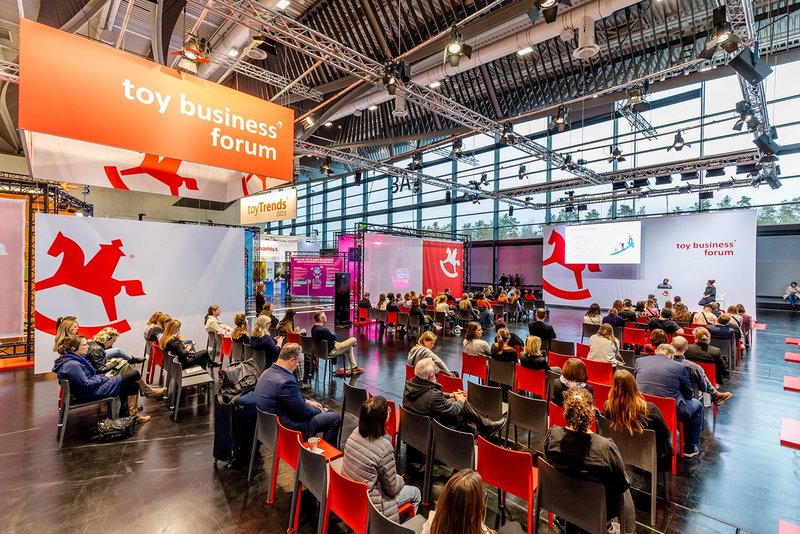
What is the metaverse?
Dominik Griese explains the world to Sibylle Dorndorf
From Sibylle Dorndorf
Have you ever asked yourself how to get to the metaverse? Or what it is and what you can do with it? If you answered yes, then you’ve come to the right place. Stick with us, Dominik Griese knows the way.
Fill me in, Dominik: explain the metaverse to me.

Dominik Griese: That’s simple: the metaverse is the embedding of virtual and digital content in reality.
Do I need a special headset for this?
Dominik Griese: No, you don’t need a virtual reality headset to enter the metaverse. A smartphone or computer with an internet connection is enough. You might imagine the metaverse as simply a 3D internet that places an emphasis on decentralisation and democratisation.
A kind of parallel world?
Dominik Griese: It’s what you make of it – blockchain, NFTs and virtual, augmented and mixed reality are part of it, subjectively speaking. But there’s also artificial intelligence (AI), and the people using the metaverse have the freedom to shape it themselves through content, design and colour.
Like Pippi Longstocking: make the world the way you like it?
Dominik Griese: Rather "show the world...". The metaverse can present virtual content to us in a way that is more vivid than ever before. Imagine you book a holiday in Italy based on some great reviews. But then it turns out that the hotel and surroundings have just been cleverly photographed. You’re looking out on a building site rather than the sea. There is one bar after another. If you could have visited a virtual copy of the location beforehand then you wouldn’t have made the booking.

And what did you mean before about democratisation?
Dominik Griese: Google "pregnancy". What’s the first thing that appears? A pregnancy test that you can buy. The internet is no longer a place where quality and knowledge are paramount; it’s already being shaped by companies willing to spend a great deal of money. Through democratising methods, the metaverse offers users of the "new" internet a way to shape rules and design how things work for themselves. The current internet, on the other hand, is constructed and controlled by Big Tech.
Many parents worry that their children will drift off into the metaverse...
Dominik Griese: In the past, many parents also worried that their children would stop going outside and turn into bookworms instead. And the next generation of parents pressed books on their children because they were just sitting in front of the telly. In my group of friends, young parents wish their children would watch TV instead of being on their mobile phones all the time. My biggest worry is that parents might be too naive in approaching the topic and may not inform themselves sufficiently about the metaverse. How many children are already playing Roblox and Fortnite, which are semi-metaverses? Do their parents know what goes on there or why children now want their pocket money in Robux, the Roblox currency, rather than euros?
That brings us on to the topic of media literacy.
Dominik Griese: That’s the most important thing. But for children to be media literate, parents have to understand this whole area themselves. And not just parents – schools, too, should teach media literacy. After all, the same risks are present in the metaverse as on the internet.

What might parents like about the metaverse?
Dominik Griese: The metaverse imparts added value. In areas like creativity in particular, but also technology. Many children are already developing their own virtual worlds. This involves creative thinking, as these virtual worlds are often places where they can play with friends. And so they obviously want them to be as impressive as possible. Coding skills are also being developed. Many metaverses offer their own world-building software with which young people in particular learn to code at an early stage. Is there anything currently more future-proof than coding?
Large toy brands are already investing in the metaverse. Why?
Dominik Griese: The metaverse can be used for everything from positioning brands to increasing sales. For me, it makes most sense to use the metaverse at this time to assert your message and brand in the best possible way. In the past, people got an idea of whether Nutella tastes good from a clip on the TV lasting 10 to 15 seconds. Today, younger target groups are being addressed using totally different means. Experiences that bind users to brands for many hours, gamify the brands and make them accessible ensure sustainable brand value.
Which toy-related products are already feasible today and which are conceivable?
Dominik Griese: I think the question is really which products are not suitable for the metaverse. The toy world is pretty much the best industry for it. Toys that can be brought to life virtually. Experiences that illustrate the back story of new toys and make them real. If such play and enjoyment don’t then cause people to want the real toys themselves, I don’t know what would.
This is Dominik Griese
Dominik Griese has been engaged with the metaverse since 2018. In early 2021, he created The MetaSpace, the first German-language blog about the metaverse. Since then, Dominik has been a critic of the hype and tries to explain in the simplest possible way what the metaverse is, the potential it offers, where it can be located and where the dangers may lie.
Check out his blog, The MetaSpace
Presentation by Dominik Griese at the Toy Business Forum 2023
The link to the presentation works once registered for Spielwarenmesse Digital via email address.
Sibylle Dorndorf has been writing about the toy industry for almost 30 years.
Most recently, the journalist was editor-in-chief of the TOYS magazine family at Göller Verlag, Baden-Baden. Her passion: companies that reinvent themselves, brands that position themselves credibly, people who have something to say and products with a future.




